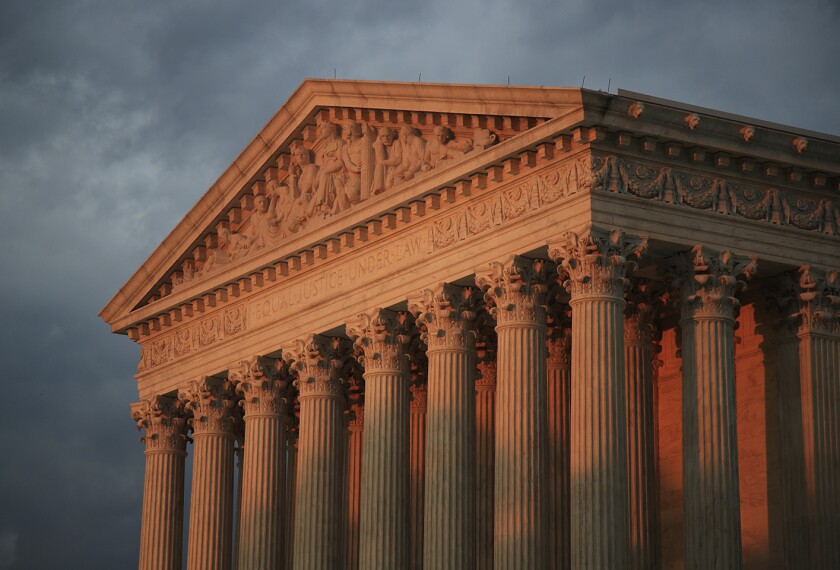The U.S. Supreme Court dealt a defeat last week to organized labor, including teachers’ unions, in a case involving service fees for nonunion employees.
The high court ruled 7-2 that nonunion workers who object to the cost of their “agency fees,” which are assessments for collective bargaining services, may challenge the fees in federal court without first going through a special arbitration procedure favored by unions.
The ruling in Air Line Pilots Association v. Miller (Case No. 97-428) was a victory for a group of nonunion Delta Air Lines pilots who objected to their service fees, as well as for the National Right to Work Legal Defense Foundation, which is engaged in numerous battles over the same issue with the 2.3 million-member National Education Association.
The foundation contends that the NEA uses the arbitration procedure to bog down nonunion teachers’ challenges to service fees. The foundation argues that money from nonunion members’ fees is often used for political and lobbying activities that are not related to collective bargaining costs.
“This is a very clear-cut victory” for nonunion employees, said Stefan Gleason, the director of legal information for the Springfield, Va.-based National Right to Work foundation. “The NEA is probably the most frequent user of these compulsory-arbitration schemes. They want to keep people out of their books.”
The union strongly disputes charges that it makes improper use of nonmembers’ fees.
1986 Case
The Supreme Court ruling stems from the right of unions to charge a fee for the costs of collective bargaining to workers who decline to join the labor organizations. A union is not supposed to include other costs in the service fee, such as those for political lobbying.
In the 1986 case of Chicago Teachers Union v. Hudson, the high court said unions must provide a hearing before an “impartial decisionmaker” for workers who object to the amount of their service fees. Although the ruling was a defeat for teachers’ unions, they have come to favor the arbitration procedure as an economical way to settle service-fee objections.
The NEA has said that about one-fourth of nonmember fee-payers object to the amount of their service fees. The typical amount at issue is about $200 to $500 a year, and some nonmembers are strongly concerned that some of their money could be going to support the NEA’s political causes.
The National Right to Work group believes the arbitration procedure is stacked in the unions’ favor, and it has preferred to challenge the service fees in lawsuits in federal court.
In its May 26 ruling in Miller, the high court settled a split in lower federal courts about whether nonunion workers must exhaust the arbitration procedure before challenging the fees in federal court.
In the majority opinion, Justice Ruth Bader Ginsburg said the 1986 Hudson ruling does not “compel objectors to pursue that remedy.”
She said the majority refused to interpret Hudson “in a manner that might frustrate its very purpose, to advance the swift, fair, and final settlement of objectors’ rights.”
In a dissent joined by Justice John Paul Stevens, Justice Stephen G. Breyer said the Hudson case suggested “approval, not disapproval, of a union rule that would require initial participation in prompt, but non-binding, arbitration.”
NEA Sees Complications
Jeremiah W. Collins, a lawyer representing the NEA, said he was disappointed by the ruling.
“This could lead to more complications and litigation, and more waste of resources,” he said.
But he rejected the contention of the National Right to Work foundation that greater scrutiny in federal court cases would reveal improper expenses being charged to nonunion workers.
“That’s off base,” he said. “This is not going to lead to the unveiling of some great hidden practices of unions.”
Furthermore, he said, the high court left open the possibility that federal courts will delay ruling on direct fee challenges from nonunion workers to await the outcome of related arbitration proceedings.
“The opinion still leaves open the possibility that the arbitration process will play the role it is supposed to play,” he said.
The NEA had filed a friend-of-the-court brief in the Miller case on the side of the pilots’ union. Two NEA affiliates, the Anchorage Education Association and NEA-Alaska, have a separate Supreme Court appeal pending that also involves the arbitration issue.
The U.S. Court of Appeals for the 9th Circuit, based in San Francisco, ruled last year that nonunion teachers who were challenging their service fees did not have to go through the arbitration process.
The unions’ appeal of that ruling in Anchorage Education Association v. Patterson (No. 97-1454) was being held by the high court to await the outcome of the pilots’ case.
Separately last week, the justices rejected without comment the appeal of a teacher fired from a Connecticut school district some 24 years ago.
Elinor Halpern was fired from the Bristol, Conn., district in 1974 for “alleged inefficiency and insubordination.”
Her legal challenge was been up and down the Connecticut state courts ever since. The school board reaffirmed her dismissal in 1995, and several state courts rejected her claims that she was denied due process of law.
The appeal was Halpern v. Bristol Board of Education (No. 97-1621).





